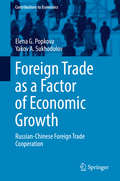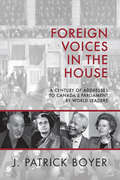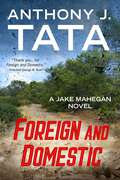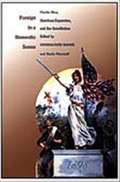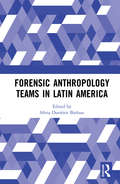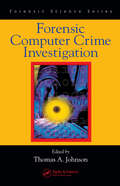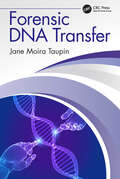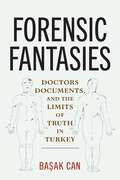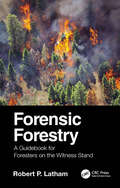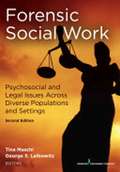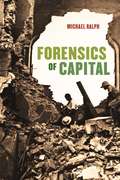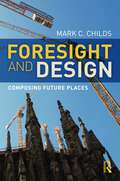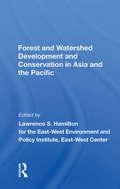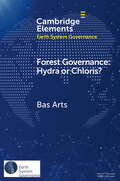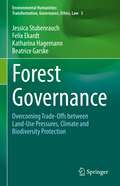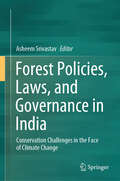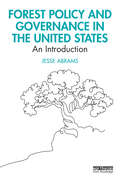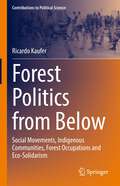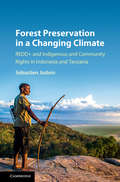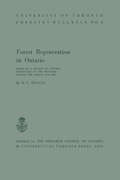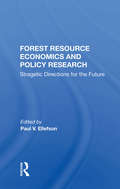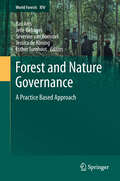- Table View
- List View
Foreign Trade as a Factor of Economic Growth
by Elena G. Popkova Yakov A. SukhodolovThis book analyzes the evolution of foreign trade cooperation between Russia and China in the context of the rapidly growing global economy, especially in the Asian-Pacific region. The approach presented in the book is characterized by a comprehensive view on macroeconomic dynamics and the process of evolving means of production. The authors describe characteristics of national innovational economies with examples from countries in the Asian-Pacific region.
Foreign Voices in the House: A Century of Addresses to Canada's Parliament by World Leaders
by J. Patrick BoyerUnique views from John F. Kennedy, Nelson Mandela, Indira Gandhi, and dozens of other world leaders reveal Canada and Canadians through their eyes. During the First World War, foreign leaders began addressing Canadians in our House of Commons and, ever since, have continued influencing how we think about our role in global affairs. For a century now, this parade of world figures has brought urgent messages about Canada’s importance in world wars, the United Nations, Cold War security, decolonization and modernization, advancing human rights, environmental conservation, and combating terrorism. All of the foreign leaders addressing Canada’s parliament sought to forge new partnerships between their own countries and ours in a rapidly evolving global context. Over the decades these speeches chart the stunning transformation of international affairs and Canada’s place in the world. No other source provides a complete record of this body of high-level oratory, gathered here for the first time in Foreign Voices in the House.
Foreign and Domestic (A Jake Mahegan Thriller #1)
by Anthony J. Tata&“ABSOLUTELY FANTASTIC…PULSE-POUNDING.&” —Brad Thor #1 New York Times bestselling author One year ago, Captain Jake Mahegan led a Delta Force team into Afghanistan to capture an American traitor working for the Taliban. The mission ended in tragedy. The team was infiltrated and decimated by a bomb. An enemy prisoner was killed. Mahegan was dismissed from service—dishonored forever. Now, haunted by the incident, Mahegan is determined to clear his name. The military wants him to stand down. But when the American Taliban returns to domestic soil—headed by the traitor who ruined his life—Mahegan is the only man who knows how to stop him. Outside the law. Under the radar. Out for vengeance… &“I thoroughly enjoyed it…well done! Thank you…for Foreign and Domestic.&” --President George Bush &“Thrilling read!&”--Former Texas Governor Rick PerryBrigadier General Tata donates a portion of his earnings to the USO Metro DC, the North Carolina Heroes Fund, and the Michael Murphy Foundation.
Foreign and Domestic Investment in Argentina
by Alison E. PostPolitical economy scholarship suggests that private sector investment, and thus economic growth, is more likely to occur when formal institutions allow states to provide investors with credible commitments to protect property rights. This book argues that this maxim does not hold for infrastructure privatization programs. Rather, differences in firm organizational structure better explain in the viability of privatization contracts in weak institutional environments. Domestic investors - or, if contracts are granted subnationally, domestic investors with diverse holdings in their contract jurisdiction - work most effectively in the volatile economic and political environments of the developing world. They are able to negotiate mutually beneficial adaptations to their contracts with host governments because cross-sector diversification provides them with informal contractual supports. The book finds strong empirical support for this argument through an analysis of fourteen water and sanitation privatization contracts in Argentina and a statistical analysis of sector trends in developing countries.
Foreign in a Domestic Sense: Puerto Rico, American Expansion, and the Constitution
by Christina Duffy Burnett Burke MarshallIn this groundbreaking study of American imperialism, leading legal scholars address the problem of the U. S. territories. Foreign in a Domestic Sense will redefine the boundaries of constitutional scholarship. More than four million U. S. citizens currently live in five "unincorporated" U. S. territories. The inhabitants of these vestiges of an American empire are denied full representation in Congress and cannot vote in presidential elections. Focusing on Puerto Rico, the largest and most populous of the territories, Foreign in a Domestic Sense sheds much-needed light on the United States' unfinished colonial experiment and its legacy of racially rooted imperialism, while insisting on the centrality of these "marginal" regions in any serious treatment of American constitutional history. For one hundred years, Puerto Ricans have struggled to define their place in a nation that neither wants them nor wants to let them go. They are caught in a debate too politicized to yield meaningful answers. Meanwhile, doubts concerning the constitutionality of keeping colonies have languished on the margins of mainstream scholarship, overlooked by scholars outside the island and ignored by the nation at large. This book does more than simply fill a glaring omission in the study of race, cultural identity, and the Constitution; it also makes a crucial contribution to the study of American federalism, serves as a foundation for substantive debate on Puerto Rico's status, and meets an urgent need for dialogue on territorial status between the mainlandd and the territories. Contributors. Jos Julin lvarez Gonzlez, Roberto Aponte Toro, Christina Duffy Burnett, Jos A. Cabranes, Sanford Levinson, Burke Marshall, Gerald L. Neuman, Angel R. Oquendo, Juan Perea, Efrn Rivera Ramos, Rogers M. Smith, E. Robert Statham Jr. , Brook Thomas, Richard Thornburgh, Juan R. Torruella, Jos Tras Monge, Mark Tushnet, Mark Weiner
Foreldreløse-sammensvergelsene
by James Morcan Lance Morcan Elisabet NorrisDenne saksprosa boka handler om politiske, vitenskapelige og finansielle innsikt inn i Morcans' bestselgende internasjonale trillerserie Den Foreldreløsetrilogien (noveller som slår sammen fakta og fiksjon ved å innarbeide virkelige teorier om offentlige personer og store organisasjoner). Her gir forfatterne detaljert analyse for hver enkelt av disse kontroversielle teoriene. Foreldreløse-sammensvergelsene, med forord fra den ledende forskeren Dr. Takaaki Musha og etterord av den berømte historikeren Professor Richard Spence, innbefatter vanskelig-å-finne kunnskap. På mange måter er dette grundig undersøkte verket den hemmelige historien om 20. og 21. århundre. Men mer enn bare en historie, avslører den også hva som skjer akkurat nå bak kulissene - i undergrunnsbunkere, i maktens korridorer, i de største bankene og møtene hos verdens eliter. Morcanene kobler prikkene mellom mange illberyktede hendelser i nyere tid og fjerner de tilsynelatende uendelige klassifiserte lagene av regjeringer og etterretningsbyråer. Sjokkerende, avslører de en avbryter sivilasjon som arbeider i blant oss og har til rådighet ekstraordinære undertrykte teknologier, ubegrensa ressurser og enorme svarte budsjetter - alt uforvarende finansiert av hverdagens skattebetaler. Med sine innsamlede bevis fra rettsaker, deklassifiserte regjeringsfiler og hovedstrømmens medierapporter, formidler forfatterne lite kjente fakta om en lang rekke emner. Skrevet fra forskjellige perspektiver; enkelte ganger ved å gi en stemme til sammensvergelsesteoretikere; andre ganger ved å støtte tvilere; skiftende mellom seriøs undersøkende skriving og ironi, selvironisk humor - leverer Foreldreløse-sammensvergelsene en balansert avsløring av noen av de viktigste saker i vår tid. Gå lengre enn rykter og sammensvergelsesteorier til dokumenterte fakta og bekreftet virkelighet og finn ut hvor dypt kaninh
Forensic Anthropology Teams in Latin America
by Silvia Dutrénit BielousThis book charts the development of forensic anthropology teams in Latin America and surveys their main characteristics, achievements, and challenges in light of a recent past fraught with state repression and violence. The volume contains contributions by an interdisciplinary group of scholars from several Latin American universities, with chapters on Argentina, Chile, Uruguay, Peru, Guatemala, and Mexico. These countries’ shared legacy is a host of human rights violations that continue to have an impact on present day society. Following the move towards democracy and a public demand for truth and justice, the volume highlights the role of forensic anthropology teams and their contribution as a source of information for the historical narrative, as a legal asset in enforcing the right to truth, and in achieving reparation for victims. This collection will be of interest to scholars from Anthropology, Latin American Studies, Politics, and History.
Forensic Computer Crime Investigation (International Forensic Science and Investigation)
by Thomas A. JohnsonThe Digital Age offers many far-reaching opportunities - opportunities that allow for fast global communications, efficient business transactions and stealthily executed cyber crimes. Featuring contributions from digital forensic experts, the editor of Forensic Computer Crime Investigation presents a vital resource that outlines the latest strategi
Forensic DNA Transfer
by Jane Moira TaupinForensic DNA Transfer provides a guide to the recognition and current understanding of DNA transfer in forensic criminal investigations. Increased improvements in technology mean that it is now routinely possible to obtain DNA profiles from non-visible deposits. How or when the DNA in question was deposited may be an issue in the context of the case, especially if the donor of the DNA is not in dispute. A DNA profile alone cannot reveal when or how that DNA was deposited at a crime scene, nor can it reveal the body matter from which it originated. Issues of transfer associated with activities may be debated – which the traditional discrimination purpose of DNA profiling cannot address. DNA may be everywhere and anywhere – in homes, at workplaces, during transport, and on personal items including clothing. DNA from a person may be on an object they have never contacted or in a room they have never entered. Concepts discussed in the book include non-self DNA on hands through day-to-day activities, the prevalence of background DNA in the environment and perhaps on the exhibit, the persistence of any DNA transferred, and that a DNA result will depend on these variables as well as recovery techniques. Since DNA may be transferred to an exhibit: (a) during the commission of a crime, (b) before the crime, and/or (c) after the crime through handling, examination, and testing, this book covers various transfer pathways and sources of DNA. Inadvertent issues of transfer of DNA resulting in wrongful convictions and the misleading of investigations are discussed, with an emphasis on contamination mitigation. Forensic DNA Transfer examines the additional complexity resulting from non-visible deposits of DNA that impact on sampling and testing regimes. The changing understanding of the composition of purported 'touch DNA' deposits from the skin, including extracellular DNA transported via body secretions is described. Further, the newer focus on interpreting DNA evidence – using activity level propositions and the rationale and associated issues – is also discussed.
Forensic Fantasies: Doctors, Documents, and the Limits of Truth in Turkey
by Başak CanHow progressive doctors, medical institutions, and state forces in Turkey use forensic methods to detect, erase, and reveal evidence of state violenceForensic Fantasies explores the role of medical documentation and evidence in uncovering human rights violations. Anthropologist Başak Can examines how progressive doctors, medical institutions, and state forces in Turkey use forensic methods to detect, erase, reveal, and transform violence exerted against populations deemed to be enemies of the state.Through extensive ethnographic fieldwork with doctors engaged in forensic documentation of torture, Can shows how the shared belief in the power of medical witnessing to establish truth and justice brings political activists and medical experts into community with each other; at the same time, this belief, or “forensic fantasy,” as Can terms it, can actually further entrench state power through its reliance on legal and administrative recognition of the violence it is seeking to document.Unpacking the epistemological frameworks, political histories, institutional and legal structures, professional networks, and daily practices that give rise to and sustain these forensic fantasies, Can exposes the possibilities and limits of radical documentation as a political project. Shedding new light on the tensions of our contemporary post-truth moment, Can demonstrates how forensic fantasies are vital for forming communities of experts who oppose regimes of denial and ignorance, but at the same time, have limited political efficacy in bringing about change and countering state violence.
Forensic Forestry: A Guidebook for Foresters on the Witness Stand
by Robert P. LathamForensic Forestry: A Guidebook for Foresters on the Witness Stand is a one-of-a-kind, hands-on resource for those forestry and land use professionals called upon to work on legal cases and testify in court. Land use and forestry issues in the United States, in particular—and likewise around the world—have become increasingly contentious, scrutinized, and debated. There is little to suggest that conflicts over forestlands will cease in the near future, in fact, quite the opposite. There are already a number of informative books available on land use and forestry, and related issues under the broader heading of environmental science. As such, while this book will not go into these concepts in detail, if someone is already an expert in land use and forestry, this book will tell them the ins and outs of the legal system and how they can best serve to make a case, using evidence, in a court of law. Coverage addresses the necessary background, and legwork involved, in providing technical expertise for such cases to be adjudicated. Since professionals’ expertise is often focused on ecological issues, chapters look at the economic factors and how money, policy, and corporate interests come into play—the crux of where the professional forester’s ability to present evidence and expertise becomes critical. The author provides an overall understanding of the courts, and the legal process. Coverage includes recommendations to professionals working on cases—and in the courtroom—in how to present evidence and testify in cases over land use and forestland rights, forestry management and safety, criminal and civil cases in liability in forest fires—among myriad others. Key Features: A book by a professional for professionals in the field of forestry and those called to testify in cases of forest and wildfires, eminent domain, land disputes, tort, and liability cases Written in easy-to-read, non-technical jargon to provide tools to best serve as an expert witness and consultant to support attorneys in civil and criminal cases Details unique, real-world cases study examples, detailing how they were adjudicated based on evidence and testimony provided Presents a legal background into the court system, courtroom procedure, the types of legal cases as they relate to forensic forestry As such, Forensic Forestry is a welcome addition to those professionals called upon to consult on, and testify in, such cases including land use professionals, foresters and forestry managers, ecologists, environmentalists, environmental policy advocates, and those in related fields.
Forensic Social Work: Psychosocial And Legal Issues Across Diverse Populations And Settings
by Tina Maschi George Stuart LeibowitzThis extensively revised edition reviews the latest research and practices in forensic social work. Readers learn to integrate socio-legal knowledge when working with diverse populations in a variety of settings. Noted interdisciplinary contributors review the most common forensic issues encountered in the field to better prepare readers to deal with the resulting financial, psychological, emotional, and legal ramifications. Using a human rights and social justice approach, the book demonstrates the use of a forensic lens when working with individuals, families, organizations, and communities that struggle with social justice issues. Each chapter features objectives, competencies, Voices From the Field, a conclusion, exercises, and additional resources.
Forensics of Capital
by Michael RalphAs one of Africa’s few democracies, Senegal has long been thought of as a leader of moral, political, and economic development on the continent. We tend to assume that any such nation has achieved favorable international standing due to its own merits. In Forensics of Capital, Michael Ralph upends this kind of conventional thinking, showing how Senegal’s diplomatic standing was strategically forged in the colonial and postcolonial eras at key periods of its history and is today entirely contingent on the consensus of wealthy and influential nations and international lending agencies. Ralph examines Senegal’s crucial and pragmatic decisions related to its development and how they garnered international favor, decisions such as its opposition to Soviet involvement in African liberation--despite itself being a socialist state--or its support for the US-led war on terror--despite its population being predominately Muslim. He shows how such actions have given Senegal an inflated political and economic position and status as a highly credit-worthy nation even as its domestic economy has faltered. Exploring these and many other aspects of Senegal’s political economy and its interface with the international community, Ralph demonstrates that the international reputation of any nation--not just Senegal--is based on deep structural biases.
Foresight and Design: Composing Future Places
by Mark C. ChildsEvery plan, pro-forma, design, building contract, and construction schedule is a proposal about future places. To help improve such proposals, Foresight and Design: Composing Future Places presents conceptual tools to inform design and outline the need for designers to rigorously think about potential futures. Our built compositions are constantly transforming due to continuing urbanization, demographic shifts, climate change, the evolution of virtual worlds, economic and health disparities, and other unforeseen trends. If we envision and plan for alternative futures, we are better able to purposefully respond. This book presents emerging practices of foresight, including signals of change, thick descriptions, pace layers, (re)framing, prototyping, scenarios, maps of change, storytelling, and world-building, to indicate how robust contemplation of multiple potential futures can help us compose places that are durable, resilient, and adaptable. Five brief case studies interspersed between the chapters serve as examples of practitioners exercising foresight through these practices. Contributions include a description of a regional design process in Afghanistan by Anthony Fettes of Sasaki Architects, and an exploration into the Indigenous Futurism model-making competition by Anjelica Gallegos. Written for architects, designers, planners, developers, city councilmembers, and engineers, this book encourages all composers of the built environment to envision alternative futures and purposefully respond.
Forest And Watershed Development And Conservation In Asia And The Pacific
by Lawrence S HamiltonWithout the assistance of Sherry Bryson, PublicationsOfficer of the Institute, this book would never haveappeared in press. Her work in editing and shepherdingthe manuscripts through the •preparation for printing•phase was outstanding. The diligent work of HelenTakeuchi in proofing, typing, and organizing the chaptersis gratefully recognized. And to Marietta Mendoza, whosetyping efforts went beyond the call of duty, a vote ofthanks. The authors and editor are deeply appreciative ofthe contributions of these staff members.
Forest Governance: Hydra or Chloris? Forest Governance: Hydra or Chloris? (Elements in Earth System Governance)
by Bas ArtsMany forest-related problems are considered relevant today. One might think of deforestation, illegal logging and biodiversity loss. Yet, many governance initiatives have been initiated to work on their solutions. This Element takes stock of these issues and initiatives by analysing different forest governance modes, shifts and norms, and by studying five cases (forest sector governance, forest legality, forest certification, forest conservation, participatory forest management). Special focus is on performance: are the many forest governance initiatives able to change established practices of forest decline (Chloris worldview) or are they doomed to fail (Hydra worldview)? The answer will be both, depending on geographies and local conditions. The analyses are guided by discursive institutionalism and philosophical pragmatism. This title is also available as Open Access on Cambridge Core.
Forest Governance: Overcoming Trade-Offs between Land-Use Pressures, Climate and Biodiversity Protection (Volume 3) (Environmental Humanities: Transformation, Governance, Ethics, Law)
by Katharina Hagemann Felix Ekardt Jessica Stubenrauch Beatrice GarskeThis book analyses and develops overarching concepts for forest policy and forest governance and includes a detailed investigation into the historical discussion on forests. It examines opportunities and limits for negative emissions in a sector that – like peatlands – appears significantly less ambivalent compared to highly technical large-scale forms of climate geoengineering. The analysis shows that the binding climate and biodiversity targets under international law are much more ambitious than most people assume. Measured against that, the volume critically reviews the potentials of afforestation and reforestation for climate mitigation, which is often presented as the new saviour to fulfil the commitments of the Paris Agreement and to reach climate neutrality in the future. It becomes clear that ultimately only biodiverse and thus resilient forests can function as a carbon sink in the long term. The volume shows that the existing European and international forest governance approaches fail to comply with these targets and insights. Furthermore, the book develops a bundle of policy measures. Quantity governance systems for livestock farming, fossil fuels and similar drivers of deforestations represent the most important approach. They are most effective when not directly targeting forests due to their heterogeneity but central damaging factors. With regard to the dominant regulatory and subsidy-based governance for forests we show that it remains necessary to supplement these quantity governance systems with certain easily graspable and thus controllable regulatory and subsidy regulations such as a regulatory protection of old-growth forests with almost no exceptions; extension of the livestock-to-land-ratio established in organic farming to all farming; far-reaching restriction of bioenergy use to certain residues flanked by import bans; and a national and international complete conversion of all agricultural and forest subsidies to “public money for public services” to promote nature conservation and afforestation in addition to the quantity control systems.
Forest Policies, Laws, and Governance in India: Conservation Challenges in the Face of Climate Change
by Asheem SrivastavThe book delves into the intricate relationship between India’s forest governance, laws, and policies over time, examining their effects on the quality and coverage of the country’s forests. Historically, especially during the British era and the initial phase following independence, forests were valued for timber, leading to increased deforestation to fulfill the rising demands of shipbuilding, railways, residential construction, and industry. The economic benefits derived from converting forest land for developmental purposes were a key factor in this trend. However, recent statistics indicate that except Maharashtra, most of the forest rich states including MP and Chhattisgarh have lagged in economic development. The history of overexploitation and diversion for non-forestry use has also led to less forest area per capita. India has lost tree biomass much more than its productivity potential, and the average biological productivity of Indian forest is much below the global average. It is extremely important to restore the health of natural forests which are, by far, the best and a highly cost-effective carbon sequestering machine provided by nature. The book also provides research data, both at national and global scales to convincingly put forward the contention that natural forests are sine qua non and under no circumstances can farm and roadside plantations, tea and coffee plantations, and orchards be a substitute for natural forest for three important reasons: (1) the influence of natural forest on rainfall, (2) the complexity in maintaining energy flow, and (3) the impact of natural forest or deforested sites on soil.
Forest Policy and Governance in the United States: An Introduction
by Jesse AbramsThis new textbook provides an up-to-date and comprehensive introduction to both the policy background and contemporary governance of forests in the United States. Starting with a history of the development of forest policies and conservation agencies, the book then explores the diversity of forest owners, users, and uses and examines emerging approaches to forest governance that cross traditional jurisdictional and property boundaries. It tackles key contemporary issues such as the forest water nexus, the conservation of threatened and endangered species, and the challenges of managing fire, insect, and disease dynamics under a changing climate. Key focal areas include the emergence of collaborative approaches to forest governance, community forest relationships, changes to corporate timberland ownership, and contemporary governance mechanisms such as certification and payments for ecosystem services. This text raises the "big questions" about the distribution of rights and responsibilities in forest management, the tensions between equity and efficiency, and how to sustain a diversity of forest values under the pressures of ecological and social complexity. Written in an accessible and engaging manner, this textbook provides a timely synthesis of both the foundations and current trends and issues in forest policy and governance in the United States with a strong emphasis on illustrative real-world cases. Forest Policy and Governance in the United States is essential reading for students in forest and natural resource policy courses and will be of great use to students in environmental governance courses. It will also be of interest to policymakers and professionals working in forest conservation and in the forest industry.
Forest Politics from Below: Social Movements, Indigenous Communities, Forest Occupations and Eco-Solidarism (Contributions to Political Science)
by Ricardo KauferThis book presents an analysis of forest politics that employs a broader scope to include non-institutionalized actors. It offers a comparative perspective on various environmental social movements fighting to protect forests around the globe, including indigenous communities in the Amazon and eco-anarchists in Europe. By examining the political goals, motives, and tactics of these sometimes-radical environmentalists, it helps readers understand the commonalities and differences among these “grass-roots forest politicians.” In addition, the book highlights the importance of forest-related struggles for a just transition to a carbon-neutral future. Accordingly, it will appeal to scholars of political science, public policy, and political sociology, as well as anyone interested in social movements and forest conservation.
Forest Prairie Edge: Place History in Saskatchewan
by Merle MassieSaskatchewan is the anchor and epitome of the ‘prairie’ provinces, even though half of the province is covered by boreal forest. The Canadian penchant for dividing this vast country into easily-understood ‘regions’ has reduced the Saskatchewan identity to its southern prairie denominator and has distorted cultural and historical interpretations to favor the prairie south. Forest Prairie Edge is a deep-time investigation of the edge land, or ecotone, between the open prairies and boreal forest region of Saskatchewan. Ecotones are transitions from one landscape to another, where social, economic, and cultural practices of different landscapes are blended. Using place history and edge theory, Massie considers the role and importance of the edge ecotone in building a diverse social and economic past that contradicts traditional “prairie” narratives around settlement, economic development, and culture. She offers a refreshing new perspective that overturns long-held assumptions of the prairies and the Canadian west.
Forest Preservation in a Changing Climate: REDD+ and Indigenous and Community Rights in Indonesia and Tanzania
by Sébastien JodoinThis book provides a comprehensive socio-legal examination of how global efforts to fight climate change by reducing carbon emissions in the forestry sector (known as REDD+) have affected the rights of Indigenous Peoples and local communities in developing countries. Grounded in extensive qualitative empirical research conducted globally, the book shows that the transnational legal process for REDD+ has created both serious challenges and unexpected opportunities for the recognition and protection of indigenous and community rights. It reveals that the pursuit of REDD+ has resulted in important variations in how human rights standards are understood and applied across multiple sites of law in the field of REDD+, with mixed results for Indigenous Peoples and local communities in Indonesia and Tanzania. With its original findings, rigourous research design, and interdisciplinary analytical framework, this book will make a valuable contribution to the study of transnational legal processes in a globalizing world. This title is also available as Open Access. Explores the opportunities as well as the challenges that REDD+ has created for the protection of human rights in developing countries. Provides comprehensive analysis of the implications of REDD+ for the rights of Indigenous Peoples and local communities. Original findings developed through extensive fieldwork provide new insights for those working on the intersections of REDD+ and rights.
Forest Regeneration in Ontario: Based on a Review of Surveys Conducted in the Province during the Period 1918-1951 (University of Toronto Forestry Bulletin #no. 2)
by R. C. HosieThis volume reports all the information presently available from the fifty-seven regeneration surveys carried out to the present by government and private agencies within the Province of Ontario. <P><P>It presents a general view of the nature of tree reproduction on cut-over forest land, followed by an analysis of the procedure in conducting and reporting regeneration surveys, and conclusions and recommendations for the conducting of future surveys.
Forest Resource Economics And Policy Research: Stragetic Directions For The Future
by Paul V. EllefsonThis book reviews the status of discipline-wide activity in forest economics and policy research, especially investment levels, past and current program emphasis, program planning, and organizational involvement. It defines strategic directions for forest economics and policy research.
Forest and Nature Governance
by Jelle Behagel Bas Arts Jessica De Koning Esther Turnhout Séverine Van BommelToday, problems such as deforestation, biodiversity loss and illegal logging have provoked various policy responses that are often referred to as forest and nature governance. In its broadest interpretation, governance is about the many ways in which public and private actors from the state, market and/or civil society govern public issues at multiple scales. This book takes a fresh perspective on the study of forest and nature governance. Departing from 'practice theory', and building upon scholars like Giddens, Bourdieu, Reckwitz, Schatzki and Callon, it seeks to move beyond established understandings of institutions, actors, and knowledge. In so doing, it not only presents an innovative conceptual and methodological framework for a practice based approach, but also rich case studies and ethnographies. Finally, this book is about how actors involved in governance talk about and work with trees, forests, biodiversity, wildlife, and so on, while acting upon forest policies, environmental discourses, codes of conduct, or scientific insights.
